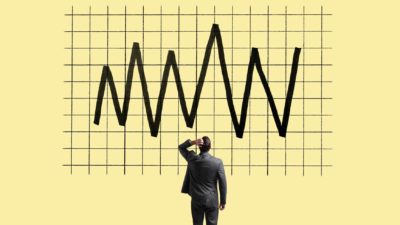Gee, there is a bit going on in business news at the moment!
Today, alone, we've heard that Qantas Airways Ltd (ASX: QAN) will have to pay more than $100m in compensation and damages to wrongly sacked employees, that two company founders have found themselves in some (allegedly) hot water, and that there are 42 concessionally-taxed Superannuation accounts that are each worth more than $100m.
The hardest part is knowing what to choose.
The policy wonk in me wants to talk about Superannuation… but I might leave that for another day (though if you want to read something I wrote about how to fix Super, take a gander at this).
This time, I want to draw together some challenging threads from three very different (yet similar) issues in the news: WiseTech Ltd (ASX: WTC) CEO Richard White's recent legal and reported dramas, Mineral Resources Ltd (ASX: MIN) CEO Chris Ellison's reported tax dealings, and yet another legal issue (and loss) for Qantas.
Now, let me get a few 'allegedly's out of the way. There has been a lot written about what Chris Ellison and Richard White may or may not have done. And as I haven't seen the first-hand evidence (and our legal team is very small!), let me say that I'm not suggesting any wrongdoing by either man – my aim here is to move on to the '… and then what?' part of those issues.
And I'm also – hey, you can never have too much controversy – going to hark back to the Prime Minister's recent house purchase (he'll be stoked that I'm raising it again, just as it was falling out of the news cycle…).
In wrapping this all together, I'm going to ask you to suspend your instinctive response to what I'm about to say. Because, well, it's complicated.
I'm going to ask you to mentally separate two issues: the rightness (or otherwise) of the circumstances, and the impact of same.
Because, well, the interaction is, as I said, complicated.
I don't know many people who love Qantas more, in October 2024, than they did a year, three years, or five years ago. There's been a litany of dramas for the airline: PR SNAFUs, an ACCC action, and more than one court case over that period… plus the company taking billions of COVID taxpayer cash and choosing not to pay it back.
And yet?
And yet, Qantas shares are… at, or very close, to an all-time high.
That is, despite all of the things we've seen and heard, investors reckon the airline is more valuable, now, than at almost any time in its past.
What gives? We'll come back to that.
Now, let's turn our minds to the – at best – bad press for Richard White and Chris Ellison. Each man, despite their imperfections, has created extraordinary wealth for their shareholders.
Does that excuse any wrongdoing that may or may not eventually be proven in court? If it happens, of course not.
But nor does any wrongdoing cancel out the very real billions of dollars that they've been (mostly) responsible for generating in their time at WiseTech and Mineral Resources, respectively.
Let. Me. Be. Very. Clear. I'm not excusing or minimising bad behaviour. And I'm certainly not saying any bad behaviour (if it happened) should be regarded as any less serious just because they're rich and successful. To the contrary, if either man is guilty of misconduct, the proverbial book should be thrown at them.
I'm just saying that both things can be true at the same time: that they may have done the wrong thing and they may have made their shareholders very rich (and in these cases, at least, there's no allegation that shareholder riches were generated because of any alleged wrongdoing).
And yes, the PM. He bought a house. That looked pretty bad, to many people. "The optics", as they said. And yet, whether or not he bought a house has exactly nothing to do with the government's (in)action on housing policy in Australia.
Sure, it 'looked' bad, but was it? Is any Australian worse off because of it? Of course not.
Now, watch me try to tie all of those things together.
If a shareholder had seen all of the bad press over the past two or three years, and avoided Qantas? They would have missed out on a 29% or a 32% gain, respectively.
Without Richard White or Chris Ellison, despite any alleged wrongdoing, how much less would WiseTech (current market cap of $35b) or Mineral Resources ($7.5b) be worth?
And how different would the Australian government's housing policy be, had the Prime Minister just kept the cash in the bank?
Lastly, why would I try to turn four controversial topics, each stirring up visceral reactions, into an investing lesson, risking the ire of my more sensitive readers?
The latter might be the hardest question to answer. After all, if I wanted to take the safe option and not risk the 'optics' of being seen to highlight the grey areas, I wouldn't even be writing this column.
But I am, because I think there are some important, if challenging, issues for investors to grapple with.
To be clear: you're welcome, and encouraged, to consider your own moral and ethical framework in all of these cases, and decide accordingly. I'm not recommending for or against any course of action.
I'm just highlighting four examples of differences between the 'actions' and the 'results' (with a nod to the 'optics').
Now, I'm not suggesting any of it was inevitable or preordained. You may be able to show me four examples where the same optics resulted in very different outcomes.
Which… is kinda my point.
All the rage these days is a concept of 'the signal and the noise'. The main idea is that there's lots and lots of 'noise' – stuff that happens, but that isn't consequential to the outcome – and there's far less, but far more important, 'signal' – the things that do accurately indicate the outcome.
Qantas court cases, ACCC investigations, COVID payments not returned and a litany of PR disasters have led to… nothing. At least, not in terms of the share price. Lots of noise, but no share price 'signal'.
To whatever degree Richard White and Chris Ellison might regret (or not) any past actions, it hasn't stopped them building companies worth billions of dollars.
Indeed, should either man leave his post, we might feel like some degree of justice had been done… but it's far from certain that shareholders will be better off for it. Indeed, removing the passion, brains and know-how from the top of those companies might mean a less rosy future for shareholders.
And, as we've said, the PM bought a house, and housing policy remains unchanged.
One more time, let me say: I'm not defending any of the actions – proven or alleged – in any of these cases. I'm not arguing for any outcome (in this space, at least) here, either.
I'm just making the point that we should be careful what causal relationships we assume exist.
(Indeed, some of the allegations against the businessmen named above are historical. Would shareholders have been better off, or worse off, if they were known earlier? Would the share prices be higher or lower had they resigned their posts at those times? We'll never know, but it's an interesting thought exercise.)
Karma, for better or worse, isn't actually a thing.
We don't all get what we deserve in life. Some of us get more, others less.
And for investors? Well, it's important to deal with the world as it is, not as you want it to be.
Companies with noble missions fail, sometimes. Tobacco companies often make a fortune.
Nice guys sometimes finish last. Sometimes they win.
My suggestion?
By all means, use your own ethical filter in your investing. But please make it your last filter.
That is, evaluate an investment idea on its own merits, and only then ask yourself if your ethics will let you buy it.
Because like it or not, there's a lot of noise out there. Mostly from others.
But 'the way we wish the world was' is a powerful internal force that can lead us astray, if we let it.
Fool on!









